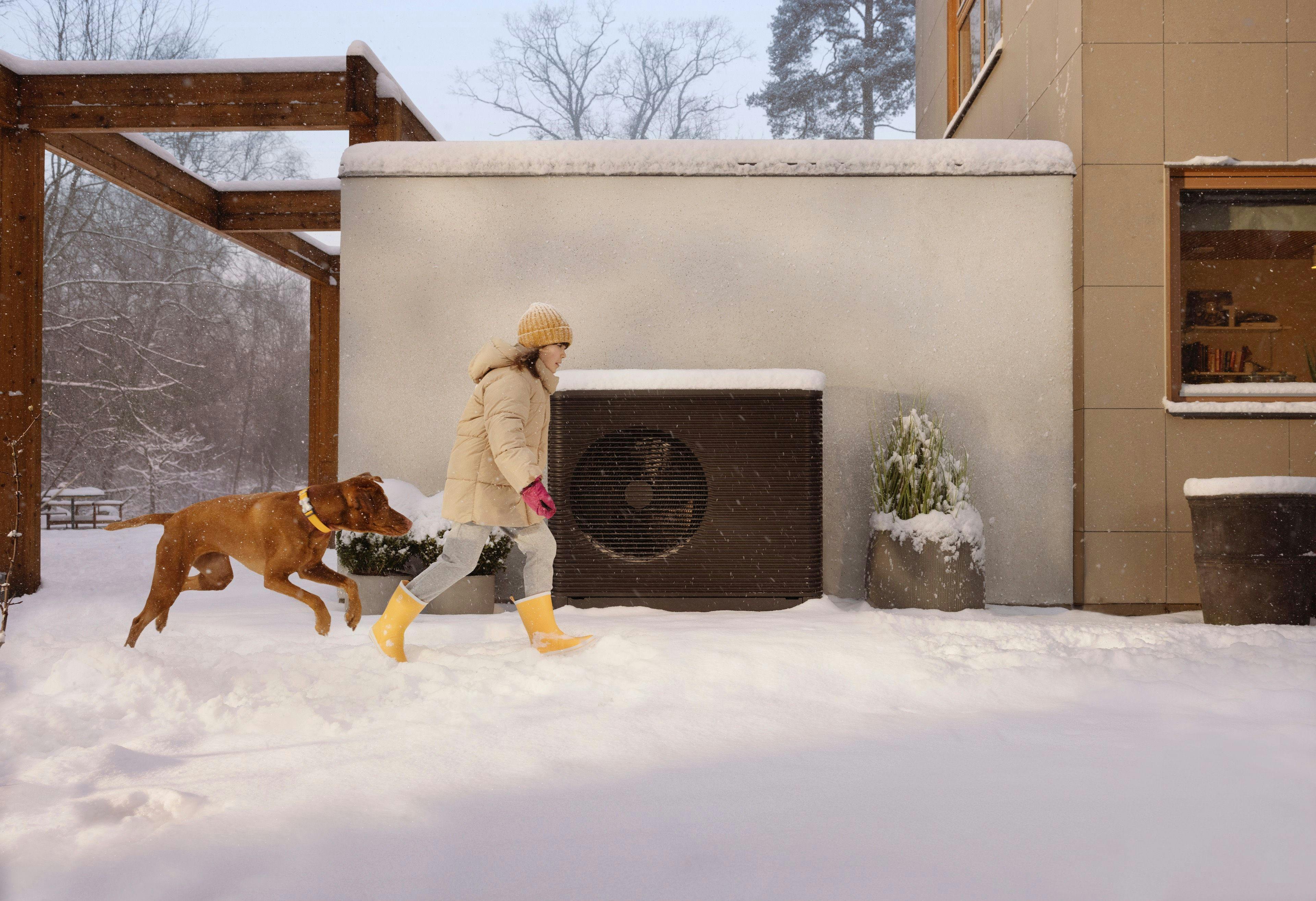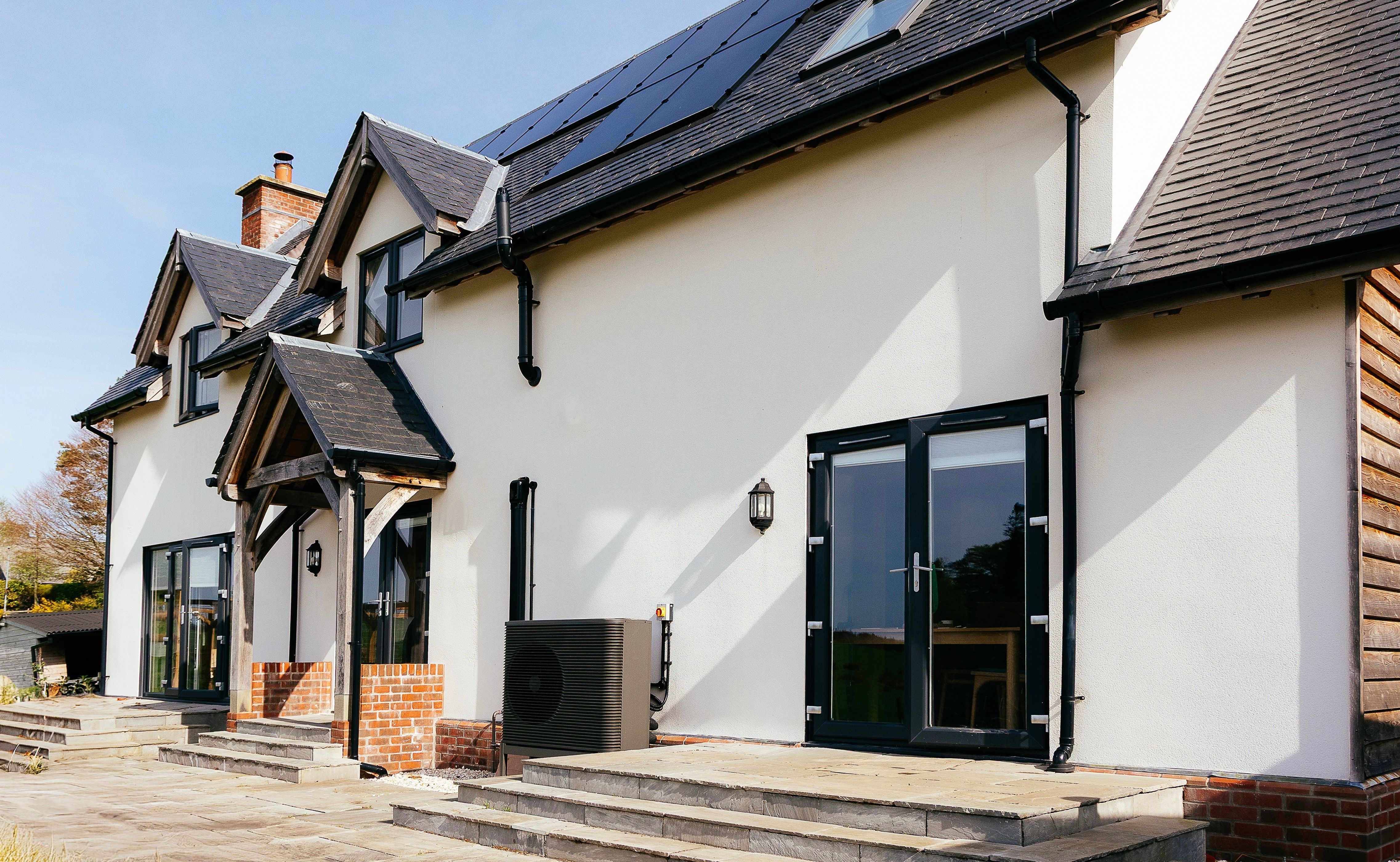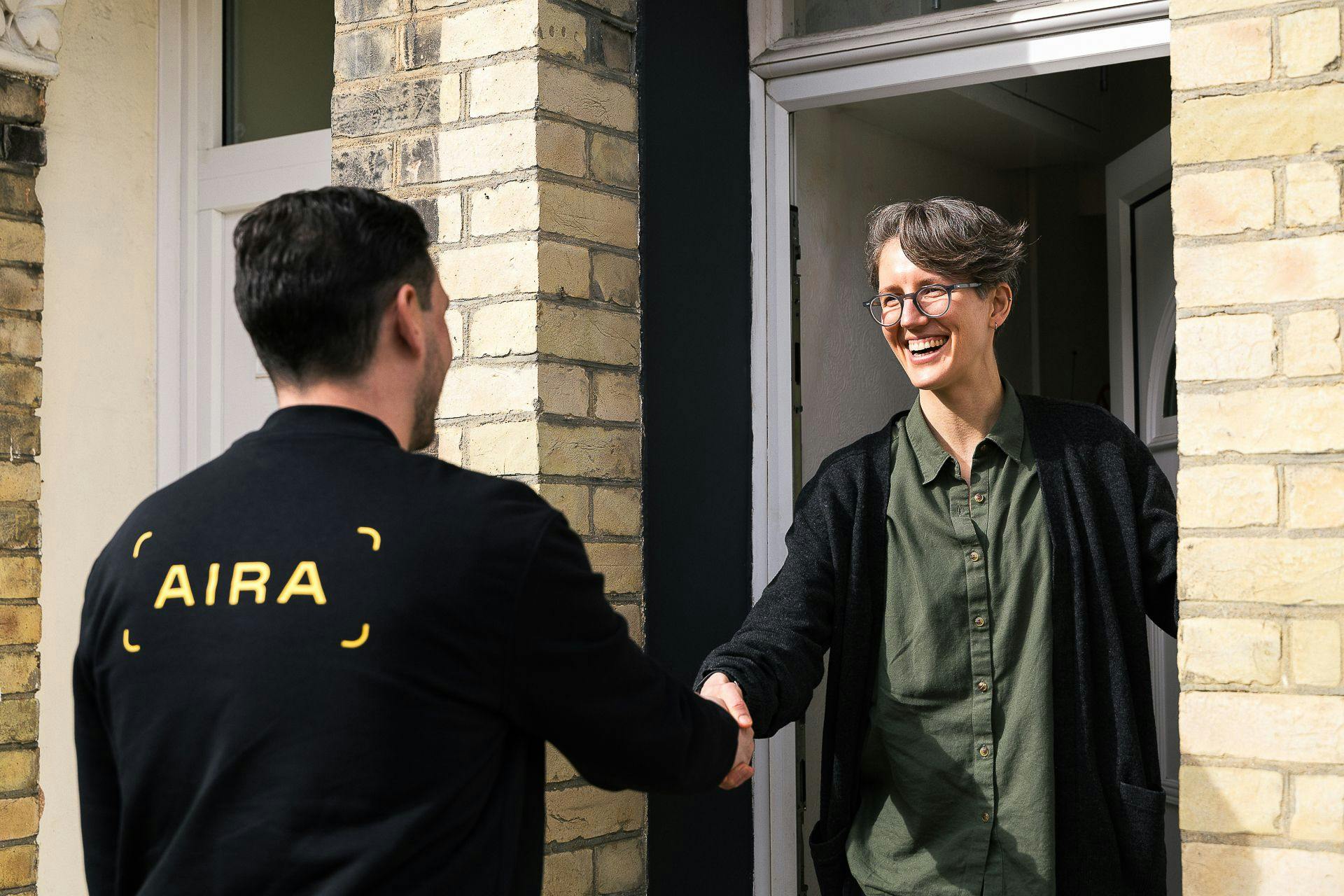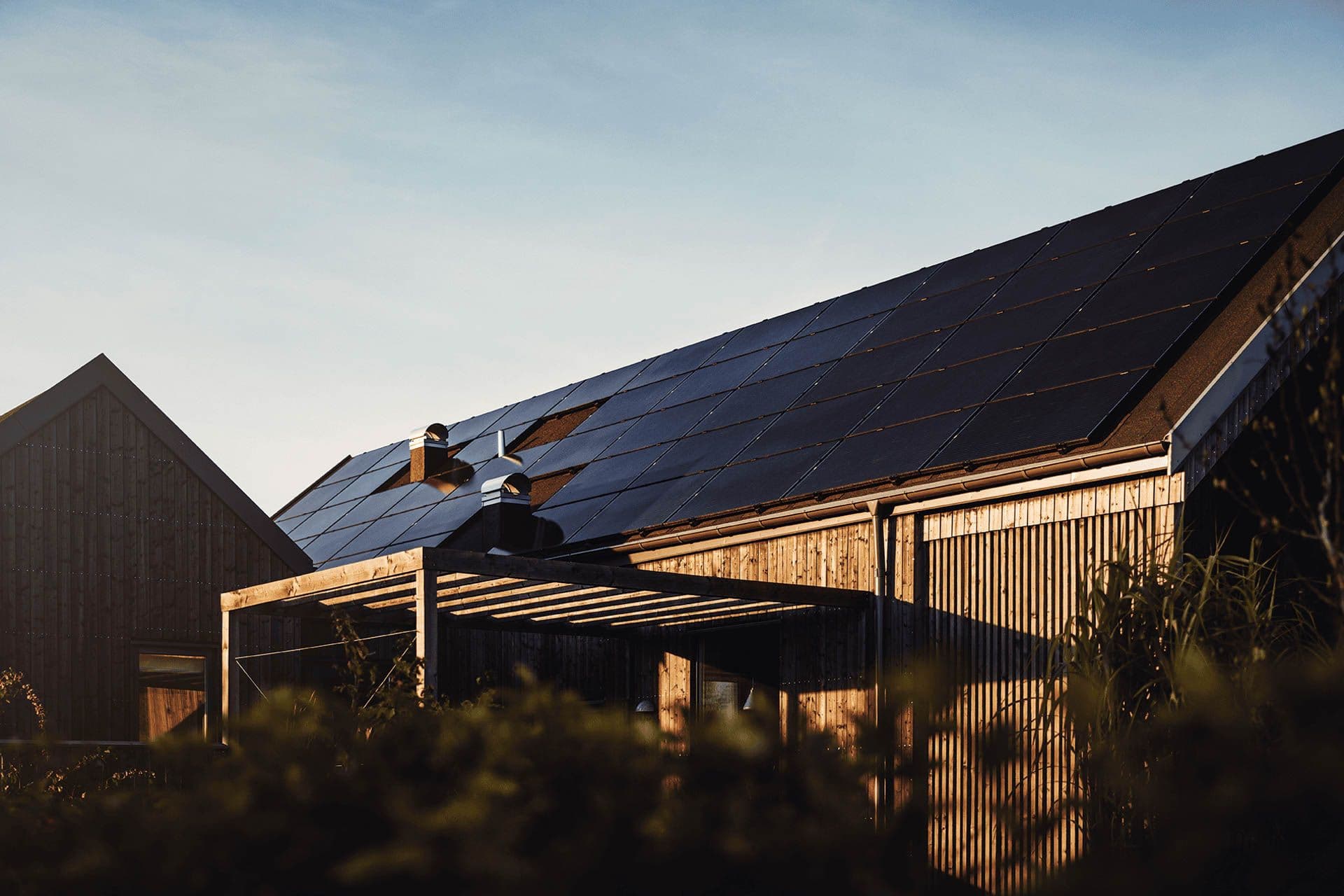16 January 2024
6 minute read
Written by:

Carl Robinson
Content Manager
Do heat pumps work in cold weather? Your complete winter performance guide.

Key takeaways
- Heat pumps work efficiently in cold weather, even well below zero. The Aira Heat Pump performs reliably down to –25°C.
- They stay far more efficient than boilers in winter, delivering around 4X the efficiency across a full heating season.
- They’re designed for cold climates. Modern heat pumps automatically handle frost, keep homes consistently warm, and remain cheaper to run all winter long. Just ask Sweden (where we’re from), where they’ve been heating homes for decades.
When temperatures drop, it’s natural to wonder whether a heat pump can keep your home warm through winter. Especially during those bitterly cold sub-zero temperatures we get in January and February.
The short answer: yes.
Modern air source heat pumps (like the Aira Heat Pump) are engineered for cold climates and continue delivering high efficiency and cosy indoor comfort even when the temperature falls well below zero.
This guide brings together everything you need to know: how heat pumps work in winter, how efficient they are in cold weather, what can affect performance, and why the Aira Heat Pump is built for freezing temperatures.
Do heat pumps really work in cold weather?
Absolutely. Even in icy conditions, there’s still plenty of heat energy in the outdoor air. And, heat pumps are designed to extract it efficiently. Not sure how they do this? Learn more about how a heat pump works here.
That’s why heat pumps remain the most efficient heating option you can choose in the UK, even in winter. Most systems work reliably down to –10°C. The Aira Heat Pump goes further, operating effectively in temperatures as low as –25°C.
How do we know heat pumps work in winter? Because we’re Swedish. And heat pumps have been the standard in Sweden for more than 30 years – and so have sub-zero winters. Yet homes stay warm, comfortable and efficient all season long.
So, whether you’re dealing with a frosty morning, a cold snap, or a full winter freeze, your home stays warm, comfortable and efficient with a heat pump.
Want to know when a heat pump is most efficient? Learn everything you need to know about heat pump efficiency in our guide.
How heat pumps produce heat in freezing temperatures
Just because the air outside is cold, it doesn’t mean there’s no heat available.
Heat pumps use a refrigerant that evaporates at extremely low temperatures (Aira uses natural R290 refrigerant, which works even in sub-zero weather). When outdoor air passes over the evaporator in the outdoor unit of your heat pump system, the refrigerant absorbs that heat and transforms it into usable warmth for your home.
This is why heat pumps don’t “freeze” internally. The physics and chemistry behind the refrigerant keep everything moving, even in harsh weather.

How efficient are heat pumps in winter?
Heat pumps remain highly efficient in winter. Far more efficient than boilers. But, just like a boiler, performance changes slightly when the weather turns icy.
Heat pump efficiency naturally varies with temperature:
When it’s colder outside, the heat pump works harder and uses more electricity.
This can reduce efficiency a little, but it still stays dramatically higher than any gas boiler.
Even in freezing conditions, a modern heat pump typically remains 2-3X more efficient than a boiler. And the Aira Heat Pump? We promise it will perform at least 4X more efficiently than a boiler as part of our 15-Year Aira Guarantee.
How to measure heat pump performance in winter
There are two ways to understand how efficiently a heat pump performs – COP and SCOP – but only one gives you the full winter picture.
COP (Coefficient of Performance):
COP shows how efficiently a heat pump is running right now. It’s useful for understanding performance at a specific temperature and moment in time. But because COP constantly changes with weather and system settings, it doesn’t tell you how the heat pump performs across a whole winter.
SCOP (Seasonal Coefficient of Performance): the best way to judge winter performance
SCOP measures efficiency over an entire heating season — including cold snaps, mild spells, and everything in between. That’s why SCOP is the most reliable way to compare winter performance.
The Aira Heat Pump, for example, can reach a SCOP of up to 4.7, meaning:
- up to 4.7 kW of heat for every 1 kW of electricity
- 400%+ efficiency, even across a full winter cycle
No boiler comes close. In fact, most struggle to reach 90% efficiency, even in mild weather.

How cold can a heat pump work?
It depends on the model, but modern heat pumps are far more capable than people expect:
- Most air source heat pumps: Efficient down to -10°C
- Aira Heat Pump: Designed for Scandinavia, reliable down to -25°C
To put that in perspective, typical UK winter temperatures sit just below 0°C – a breeze for a system designed in Sweden, where heat pumps have been the norm for decades.
Does a heat pump freeze in winter?
A heat pump can develop frost on the outdoor unit in freezing weather, but modern systems handle this automatically.
Aira Heat Pumps are equipped with an inbuilt defrost cycle that stops frost from building up on the back of the outdoor unit. With no intervention required.
No specialist winter cover or housing is needed in the UK. And the wrong type of cover can actually reduce airflow and performance.
Winter heat pump challenges: what to watch for
Even though heat pumps are built for winter, a few common-sense steps help maintain performance:
- Keep airflow clear (no leaves, no obstructions).
- Don’t constantly adjust the temperature. Set it and forget it for the best efficiency.
- Book a service visit once every two years (included in your Aira all-inclusive plan).
- Ensure good insulation to reduce heat loss and keep flow temperatures low (we’ll make sure your home is set up perfectly and tell you of any home upgrades following a free home energy assessment).
These simple actions help your system run smoothly and efficiently – even on the coldest nights.
So, are heat pumps woth it in cold climates?
Yes. And here’s why:
1. They’re far more efficient than boilers
Heat pumps are around 4X more efficient, translating directly into lower running costs. Even on cold days.
2. They perform reliably in harsh weather
Scandinavia and northern Europe have used heat pumps for decades in far colder climates than the UK.
3. They cut your carbon footprint
Heat pumps reduce heating-related emissions by around 75% – and 100% when powered by green electricity.
4. They’re cheaper to run long-term
Even with slightly higher electricity use during cold spells, heat pumps remain around 25% cheaper to run than traditional heating systems in winter.
So, heat pumps work brilliantly in cold weather. And remain efficient, dependable, and significantly cheaper to run than boilers all winter long. This is why we say switching from a boiler to an Aira Heat Pump is a no-brainer.
Get a free home energy assessment
Tell us about your home and heating so we can arrange your free home energy assessment – and show you how much you could save.
What type of house do you live in?
Keep learning
Similar articles to expand your knowledge

Published today
Carl RobinsonThe Warm Homes Plan: what it really means for your energy bills
The UK’s new Warm Homes Plan confirms one thing: the future of cheaper energy is clean, electric homes. Here’s what the plan really means for homeowners. And how heat pumps, solar and home batteries can cut your bills long before 2030.

Published at 15 Jan 2026
Carl RobinsonIs a heat pump ideal for your semi-detached home?
Think heat pumps are only for large detached homes? In reality, semi-detached houses are perfectly suited to them. We delve into why heat pumps work so well in these homes and whether yours is ready for the swtich.

Published at 6 Jan 2026
Carl RobinsonSolar panels with home battery storage: is it worth it?
Solar panels generate free, 100% clean energy, but a home battery is what helps you use more of it. By storing excess solar power for later, battery storage can make solar far more effective. Here’s why solar and batteries belong together. And where Aira fits in.

Published at 19 Dec 2025
Carl RobinsonIs a heat pump ideal for your single-family detached home?
If you own a single-family detached home, you’re already in a strong position to switch to a heat pump. With full control over your space, insulation and energy use, heat pumps can deliver lower bills, steadier comfort and lower emissions all year round. Here’s what to know about performance, costs and everyday life with a heat pump in a single-family detached home.

Published at 17 Dec 2024
Carl RobinsonHeat pump efficiency explained: When is a heat pump most efficient and why
Heat pumps are the most efficient way to heat a UK home and are typically 4 times more efficient than a gas boiler. But what actually drives that efficiency? And when do heat pumps perform at their best? This guide breaks it down simply, from COP and SCOP to the real factors that shape performance.

Published at 2 Dec 2025
Carl RobinsonDo heat pumps work in older homes?
Thinking heat pumps are just for new builds? Think again. Many older homes can run a heat pump efficiently and affordably – cutting energy bills, reducing carbon emissions, and future-proofing your home. Just as a heat pump in a newbuild home would.